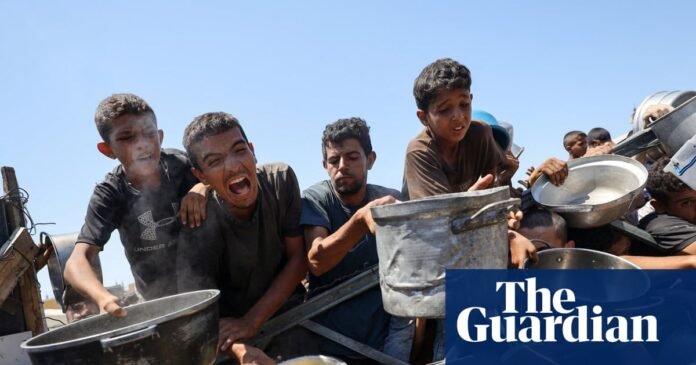A group of far-right Israeli politicians and settlers met in parliament this week to discuss a plan to displace Palestinians from Gaza, annex the territory and turn it into a hi-tech, luxury resort city for Israelis.
The scheme, titled “The master plan for settlement in the Gaza Strip”, envisions the construction of 850,000 housing units, construction of hi-tech “smart cities” that trade cryptocurrency, and a metro system that runs across the territory. It took its inspiration from an idea shared by the US president, Donald Trump, in February, when he pledged to turn Gaza into the “riviera of the Middle East”.
The text of the plan, which boasts of the economic benefits to Israel, said: “The right of the people of Israel to settle, develop and preserve this land is not just a historical right – it is a national and security obligation.”
The plan, seen by the Guardian, would require Gaza’s existing population of about 2 million to be emptied out. Legal experts warn that forcible displacement on such a scale would be tantamount to ethnic cleansing.
Michael Sfard, one of Israel’s leading human rights lawyers, said: “This is a plan for ethnic cleansing. Under international law, this would amount to a crime against humanity because deportation is a war crime when committed on a small scale and a crime against humanity when it is committed on a massive scale.”
The plan was discussed on Tuesday in the Knesset during a conference called “The riviera in Gaza: from vision to reality”. Among the speakers was the minister of finance, Bezalel Smotrich, and the settler activist Daniella Weiss. The conference drew criticism from other politicians, including Gilad Kariv, of the Democrats party, who accused Smotrich of calling for war crimes to be committed.
Weiss told the Guardian over the phone: “Gazans will not remain there. They will go to other countries. Supporters of Hamas we will fight. But those who want to live a normal life, they will have to leave Gaza because of the 7 October attack.” Palestinians would be relocated to Egypt and other unspecified “African countries”, she added.
Weiss said she had a list of 1,000 Israeli families who had already signed up to live on land in Gaza once Palestinian residents were pushed out. “My plan is to make [Gaza] paradise, to make it Singapore,” she said.
Weiss represents a small, but increasingly influential group of radical settlers within Israel who seek to illegally occupy the Gaza Strip. Their calls to create Israeli settlements have grown stronger since the 7 October 2023 Hamas-led attack, which killed about 1,200 people, and the Israeli war in Gaza, which has killed more than 60,000 so far.
The war has levelled much of Gaza and destroyed basic civilian infrastructure. The riviera plan would build luxury resorts on the ruins of Gaza once Israel stopped bombing it.
Israel’s prime minister, Benjamin Netanyahu, has denied any plans to resettle residents of Gaza, though his defence minister, Israel Katz, has suggested transferring residents to a “humanitarian city” in southern Gaza. Legal experts have called the plan a blueprint for crimes against humanity and the Israeli military itself pushed back on the idea, which it said would be a security nightmare.
Trump has also floated the idea of expelling the population of Gaza, suggesting at one point that neighbouring Jordan could take in those displaced. Trump suggested the US could assume control over Gaza to “develop” the strip – which drew the ire of human rights organisations around the world.
While the conference was beng held, Gaza’s starvation crisis continued to worsen. At least 113 people have died of hunger in Gaza, 45 of whom died in the last four days, health authorities said. Aid organisations have blamed Israel’s virtual blockade of aid into the strip for the growing levels of extreme hunger.
Human rights experts said the suggestion of displacing Gaza’s residents inside and outside the territory should not be viewed in isolation. Rather, this was part and parcel of a displacement policy.
“When an occupying power creates a coercive environment by, for instance, withholding food, and that coercive environment leaves no choice to the civilian population but to move, then this can amount to the war crime of forced displacement,” said Janina Dill, the co-director of the Oxford Institute for Ethics, Law and Armed Conflict.






